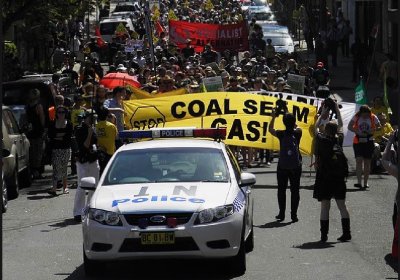897
The development of the coal seam gas (CSG) industry brings risks to Australia’s limited water resources. It draws contaminated water out of the ground, damages aquifers and uses and pollutes large quantities of freshwater. These risks, and the implications for health, agriculture and the environment, are central reasons for the growing community campaign to stop CSG mining. Images in the documentary Gasland of people setting their tap water on fire have made many question the impact of unconventional gas on water supplies.
Chanting “Coal seam gas, we will stop it; our community is not for profit”, 2000 locals marched on September 18 from Newtown’s Camperdown Park to Sydney Park in St Peters, just 200 metres from a proposed CSG mining site. The colourful march packed King Street, where most cafes and shops carried “No Gas” signs. Many pedestrians either cheered the rally or joined the march.
- Previous page
- Page 3
- Next page









